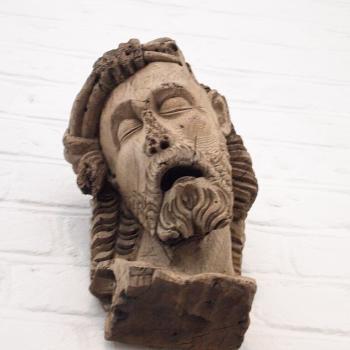![Mosaic depiction of Mary holding an Arabic text, Convent of Our Lady, Greek Orthodox Church, Sednaya, Syria. [Public domain], via Wikimedia Commons](https://wp-media.patheos.com/blogs/sites/637/2016/07/800px-Sednaya_Mary-300x286.jpg)
Our soul is meant to be united to our body. That is our proper way of life. What God intended for us in our creation was to have our soul and body working together, with the soul directing and governing the body. Due to sin, our soul’s ability to direct the body has been weakened and so the body with its passions and desires has taken control, leading us in pursuit of bodily pleasures. For many, the soul finds itself again only after death, where it is able once again to use its spiritual senses because it is no longer controlled and hampered by our body and is impulses. For others, those who have practiced self-mortification and opened themselves up to God’s grace, their soul can regain some or all of its strength and find their spiritual senses help the soul rationally guide the body beyond its inordinate desires. This, of course, is what will happen in the resurrection of the blessed dead, when the taint of sin has been entirely eliminated, so that the body can once again find its proper place and position in relation to the soul.
It cannot be stated enough that our body is itself a good gift given to us by God and it gives us a depth to our life if and when it is properly guided by the soul. This is why death itself is a tragedy. For we lose much of our integral being, and this is what makes the resurrection from the dead necessary for us if we are to truly be all that we can be in Christ. We are at our best when our soul is properly integrated with our body, where it governs by its spiritual nature instead of being governed by bodily passions, and where we are able to sense not just with our physical senses, but our spiritual ones as well.
When we can sense the spiritual reality around us, we will, as we have already said, be able to interact with other spirits. What is invisible will become visible because our spiritual blindness will have been healed. And so when a soul is separated from the body finds its spiritual senses returned, the answer that St. Thomas Aquinas gave as to how a separated soul (that is, a soul of one who has died) can know what is happening on the earth can be properly understood. As he explained, we already experience elements of the spiritual senses in our lives (such as when our soul, upon sensing something, demonstrates it to us in our dreams),[1]so we should be able to extrapolate from the experience we have in life to how the soul will interact with the spiritual realm after death:
It is undoubtedly true, however, that bodily movements and activity of the senses prevent the soul from receiving infused knowledge from separate substances. It is for this reason that certain things are revealed to persons during sleep, and to those who have [momentarily] lost their senses. Therefore, when the soul shall be separated completely from the body, it will be able to receive infused knowledge from superior substances more fully, because, thanks to such knowledge, it will be able to understand without a phantasm, which otherwise it cannot do. Nevertheless an influx of this sort will not produce knowledge as perfect and as directly related to singulars as the knowledge which we acquire here below through the senses, though a much more perfect knowledge will be had in addition to this natural influx by those souls that will enjoy the influx of a supernatural light by which they know all things most fully and will see God Himself.[2]
From what Aquinas explained, hopefully we can understand better how the soul works, and so, how it acquires knowledge, both through its spiritual senses and also in and through our body. The soul is spiritual in nature and connects us to our spiritual world. Because we have lost our spiritual senses, our focus in upon the material plane of existence. And yet we gain insight in ways we do not realize, and so what infused knowledge we attain in our soul will come to us in a form in which we are unaware of how we know such things (i.e., intuitive knowledge). Yet, at times, when we are no longer focused on material objects, such as when we sleep, our soul is freer and some of its spiritual experiences might register upon us and prevail upon us so that we learn more from them that usual. Even then our mind, being accustomed to learning through our physical senses, will try to create an imitation of such sensual input through our imagination as a way for us to understand the spiritual revelation we have received. And so it is not uncommon for us to explore the spiritual realm in and through our dreams, possibly even interacting with other spiritual entities in them, though of course, in an imperfect form as our mind creates the medium of communication based upon its extremely limited power. This is why we often awake from our sleep, recognizing we have received some great insight in our dreams, realizing that the dream itself was a figment of our creative imagination and yet there was something beyond ourselves involved which explains why we were able to gain such a breakthrough in our sleep. This follows what Ficino suggested, that is, we should seek to differentiate between the spiritual experience and the truth received in our sleep from the fantasy our minds created as a means to attaining it:
For soul has images of sensible objects at hand with such an expressive likeness that at the time they cannot be distinguished from the objects of which they are images. And whatever soul understands is as true for the sleeping soul as for the waking. If, for example, it appears to the soul that during sleep it has been in a discussion, and in the discussion, having pursued true reasons, it has learned something, then the same unchangeable [truths] remain even when it has woken up and although the rest of the context may be found to be unreal: the setting of the discussion, the person with whom the discussion appeared to have taken place, the words themselves which relate the dream and which the soul appeared to be using in the discussion, and other matters of this sort which are perceived by the senses and discussed by people awake. Yet the unreal aspects pass away and do not attain in any way the eternal presence of the true rational principles.[3]
In the spiritual world, knowledge can be shared in such a fashion that we do not always have to reason out the truth, but we can receive it through “infusion.” Knowledge can be shared in a more direct fashion. Some revelation is given to the soul, and when the soul receives it, it does so according to its ability to know and comprehend. The greatest light, the greatest illumination which shall come to the soul shall be the beatific vision, when we shall be like God and see him like he is (cf. 1 John 3:2). This blessing, this glory, is gifted to the saintly soul after its separation from the body at death, but then, after its resurrection, in a greater sense in union with its body, which is what has already happened for Mary because of her assumption and glorification in heaven. [4]
The more grace a soul has within, the purer the soul is, the greater it will be able to use all its senses, so that the saintly soul will have perfectly realized their spiritual potential while the hell-bound soul will find themselves having a very poor spiritual perception, imprisoned as it were, sensing mostly the suffering they experience due to their spiritual condition. A saintly soul, freed from the prison of sin, will be able to see and act according to its spiritual abilities to the world at large, and thus, they will be able to be attuned to the prayers offered to them and react to them. They do not have to worry about time or place, because, as spiritual beings, they transcend both. In this way, there should be no difficulty in understanding how Mary can hear our prayers. She is at the height of creation, at the edge of divinity, because God has deigned to enter her womb and to be born of her. As she is entirely open to grace, her spiritual senses as great as is possible for a created being. To doubt her ability to hear us is to doubt the freedom which is given to us in Christ – if we truly can do all things in Christ Jesus who strengthens us (cf. Philip. 4:13), then truly she can as well, and hearing our prayers is but a small portion of the potential she found in her union with Christ.
[1]What we quote from Aquinas relates to the way we learn from both particulars and universals, where the universals can and do give us an “infused” form of knowledge which is important but imperfect without the particular forms of knowledge we receive from our physical senses. The separated soul will interact with the spiritual principles of being better, and so will encounter and learn from the universals, but the particular application is best engaged in and through our body and its physical senses. The two when merged together give us a comprehensive form of knowledge, while one or the other alone will leave us diminished. There is, to be sure, yet another form of infused knowledge which is even higher and presents all particulars together with their universals, and this is in and through our vision of God, in whom we can see and experience all things.
[2] St. Thomas Aquinas, The Soul. trans. John Patrick Rowan (St Louis, MO: B. Herder Book Co., 1949), 200.
[3] Marsilio Ficino, Platonic Theology. Volume 2. trans. Michael J. B. Allen and John Warden (Cambridge: Harvard University Press, 2002), 117-19.
[4] This is why to answer to the question of whether saints know what is addressed to them from their own abilities or from God, the reply can simply be “both.” They are near God, and are illuminated by God. This illumination gives them insight, insight which they can act upon. Peter Lombard pointed out that this ability is not only found in those of us who become saints, but also the angels, because the angels, like the saints, are before God and act based upon what is revealed to them from their being in the presence of God. “But if the angels learn from God through his Word what our petitions are, and which of them is or is not to be fulfilled, why may we not believe that the souls of the saints, who contemplate the face of God, also perceive in his truth the prayers of men, and which of them are or are not to be fulfilled? “ Peter Lombard, The Sentences. Book 4. trans. Giulio Silano (Toronto: Pontifical Institute ode Medieval Studies, 2010), 249.
Angels, and therefore the saints, are not informing God something he does not know when they pray; instead, they are praising him and seeking to know his will (see ibid., 248). Their prayers, just like our prayers, open up a way for God to reveal his will. He works through them and their merits to make His will known: “And so the saints intercede for us before God; they do so both by merit, when their merits aid us, and by affection, when they desire that our vows be fulfilled. And yet they do not do this, unless they have learned that it is God’s will” (ibid., 249).
Stay in touch! Like A Little Bit of Nothing on Facebook:
A Little Bit of Nothing












